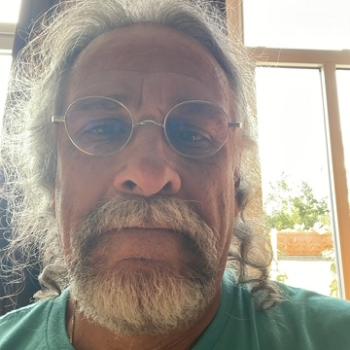Last week I attended the funeral of a good friend's husband, LeeR Lambert. A few months ago LeeR was playing handball, and then just under two weeks ago he was not, taken by cancer.
Those who spoke at the funeral reminded us that LeeR had been an unusually kind and thoughtful person. We are supposed to say nice things about the dead at a funeral, but it was easy to see that they weren't just doing what one is expected to do on these occasions. They were telling us something genuine. LeeR was an exceptional person: a devoted lover of music and mathematics and especially people, and a genuine Christian.
The usual sadness of a funeral was heightened by thinking about what a better person than I LeeR was. I hopelessly longed to be able to go back in time to do several things differently than I had, to be more like he was.
That day was a mélange of emotions: admiration for LeeR and his family, shame at myself, sorrow for Karen (LeeR's spouse), the comfort of being together with her and her family, and the peace of the gospel message. In that mélange, however, was at least one more emotion, one I often feel at funerals. Existential thinkers called it "existential dread," though dread doesn't really describe the feeling well. But fear is not as good as dread, so it isn't obvious what to call it.
Whatever the right name, the feeling came as part of recognizing my own pending absence from the world. Afterlife or no, a time is coming when I will no longer be able to touch Janice's hand as we sit together, feel the hug of a grandchild who has been angry at me but then given up his anger, or watch the rain and the sunshine pour down outside my office window.
I've seen my children grown into mature, thoughtful, kind adults. Now I long to see all of my grandchildren as happy adults and to see their children. But of course, though that chain of longing would go on forever, it cannot.
The emotion that is so apparent at a deathbed or during a funeral is often covered over by the everyday events of life. Yet it remains in the background, like the roar of the airplane engines I hear as I listen to Bach's piano music played by David Fray even though I am using noise-cancelling headphones. It is usually almost silent background noise to even the most beautiful of life's events.
Death defines me as a human being. Without it I wouldn't be the person I am. But it is also a great tragedy. If it were not a tragedy, then the message of Jesus' resurrection would be less amazing. Our experience of the death of those we love and the deaths of others as tragic should be recognized and not minimized.
It's a mistake to make light of death with easy platitudes about those who have died. We don't mean to make light of it, but we do when we say things like "God had something really important for him to do" to a suddenly single parent with young children facing a future alone. It is difficult to imagine something more important than raising a family.
Modern revelation acknowledges the necessity of our mourning "thou shalt weep for the loss of them that die" (D&C 42:45). We should allow those who mourn to mourn, and we should mourn and weep with them rather than minimizing their pain.
But mourning and hope in Christ are not mutually exclusive. If anything, the latter requires the former. If death is not a tragedy, then what Jesus did as the Messiah is less majestic: he did what is impossible; he overcame death not only for himself, but also for us.
As Christians mourn for those we have lost to death, we also have hope in the resurrection. Paul's syllogism is important (even if logicians would mark the argument invalid-denying the antecedent):
If the dead do not rise from the dead, then Christ did not do so.
If Christ did not rise from the dead, then our trust in him is useless.
If Christ did not rise from the dead, then the dead are forever dead.
If our hope in Christ is good for only this life, then we are miserable.
But Christ has risen from the dead. (1 Cor. 15:16-20)
Christ's resurrection is a proof of our faith and the cause of our hope—faith and hope that do not displace the dread of death, but live together with it.
12/2/2022 9:09:20 PM





